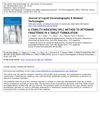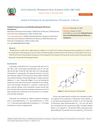 104 citations,
October 1999 in “The Journal of Urology”
104 citations,
October 1999 in “The Journal of Urology” Finasteride doesn't harm male fertility or sperm quality, but may slightly reduce ejaculate volume.
 47 citations,
April 2003 in “Journal of dermatological science”
47 citations,
April 2003 in “Journal of dermatological science” Thujae occidentalis semen extract may help treat male pattern baldness by blocking a hair loss-related enzyme and reducing hair loss in mice.
 2 citations,
October 2000 in “The Journal of Urology”
2 citations,
October 2000 in “The Journal of Urology” Finasteride daily doesn't affect sperm production or semen in young men.
 195 citations,
February 2007 in “The Journal of Clinical Endocrinology and Metabolism”
195 citations,
February 2007 in “The Journal of Clinical Endocrinology and Metabolism” Dutasteride and finasteride may reduce sperm count and volume but don't affect movement or shape; effects are reversible after stopping.
 19 citations,
December 2002 in “Journal of Liquid Chromatography & Related Technologies”
19 citations,
December 2002 in “Journal of Liquid Chromatography & Related Technologies” New method quickly and accurately measures finasteride in tablets.
 52 citations,
February 2006 in “Current pharmaceutical design”
52 citations,
February 2006 in “Current pharmaceutical design” 5α-reductase inhibitors and alpha-1 adrenergic antagonists together effectively treat benign prostatic hyperplasia, with long-term benefits.
 45 citations,
January 2008 in “Drugs”
45 citations,
January 2008 in “Drugs” Dutasteride effectively treats enlarged prostate, reduces prostate cancer risk, and promotes hair regrowth with few side effects.
 77 citations,
June 2015 in “Nature Reviews Urology”
77 citations,
June 2015 in “Nature Reviews Urology” Some common medications can harm male fertility, but many effects can be reversed.
 January 2003 in “Humana Press eBooks”
January 2003 in “Humana Press eBooks” Dihydrotestosterone and 5α-Reductase play a role in hair loss and prostate health, and finasteride can increase hair growth in men without affecting sperm production, but it doesn't work for postmenopausal women with hair loss.
 3 citations,
June 2018 in “International Journal of Clinical Pharmacy”
3 citations,
June 2018 in “International Journal of Clinical Pharmacy” Baby born healthy despite mom taking finasteride, but more research needed.
 212 citations,
September 2008 in “Journal of The American Academy of Dermatology”
212 citations,
September 2008 in “Journal of The American Academy of Dermatology” Minoxidil and finasteride treat hair loss in men, while minoxidil treats hair loss in women.
 31 citations,
January 2017 in “Phytotherapy Research”
31 citations,
January 2017 in “Phytotherapy Research” Ziziphus jujuba Mills may have health benefits, but more research is needed to confirm its safety and effectiveness.
 20 citations,
August 2018 in “The World Journal of Men's Health”
20 citations,
August 2018 in “The World Journal of Men's Health” Finasteride may increase erectile dysfunction risk in patients with benign prostatic hyperplasia.
 4 citations,
March 2019 in “Acta Chromatographica”
4 citations,
March 2019 in “Acta Chromatographica” Two methods can measure finasteride and tamsulosin hydrochloride; HPLC is more advantageous, while TLC offers better separation.
 3 citations,
January 2001 in “Cambridge University Press eBooks”
3 citations,
January 2001 in “Cambridge University Press eBooks” Finasteride effectively treats hair loss and enlarged prostate in men, with mild side effects.
 1 citations,
April 2015 in “Drug research”
1 citations,
April 2015 in “Drug research” New method measures finasteride in plasma, finds two formulations bioequivalent.
 November 2023 in “Acta scientific pharmaceutical sciences”
November 2023 in “Acta scientific pharmaceutical sciences” Different methods accurately measure Finasteride in medicines and body fluids.
 April 2017 in “International journal of research in Ayurveda and pharmacy”
April 2017 in “International journal of research in Ayurveda and pharmacy” Ayurvedic methods can help reduce the harmful effects of chemicals in cosmetics.
 January 2013 in “The Journal of Sexual Medicine”
January 2013 in “The Journal of Sexual Medicine” The document suggests that finasteride may cause depression and suicidal thoughts, while prostate surgery does not harm sexual health.
 855 citations,
June 2009 in “The Journal of Clinical Endocrinology & Metabolism”
855 citations,
June 2009 in “The Journal of Clinical Endocrinology & Metabolism” The guideline recommends mental health involvement in diagnosing gender identity disorder and outlines hormone and surgical treatment protocols, emphasizing safety, informed consent, and long-term monitoring.
 383 citations,
February 2011 in “Nature Reviews Genetics”
383 citations,
February 2011 in “Nature Reviews Genetics” DNA profiling in forensics has improved, but predicting physical traits and ancestry from DNA has limitations and requires ethical consideration.
 237 citations,
December 2001 in “Urology”
237 citations,
December 2001 in “Urology” Blocking the enzyme 5α-reductase can shrink the prostate and help treat enlarged prostate issues.
 233 citations,
November 2002 in “The journal of investigative dermatology/Journal of investigative dermatology”
233 citations,
November 2002 in “The journal of investigative dermatology/Journal of investigative dermatology” Creating stronger blockers for skin enzymes might lead to better treatment for conditions like acne and excessive hair growth.
 223 citations,
December 2010 in “The Journal of Sexual Medicine”
223 citations,
December 2010 in “The Journal of Sexual Medicine” Some patients taking finasteride or dutasteride may have ongoing sexual problems and depression even after stopping the medication.
 218 citations,
December 2011 in “Advances in Urology”
218 citations,
December 2011 in “Advances in Urology” The document concludes that the 5 alpha-reductase enzymes are important in steroid metabolism and related to various human diseases, with inhibitors used to treat conditions like male pattern baldness and prostate issues.
 209 citations,
September 2008 in “Dermatologic Therapy”
209 citations,
September 2008 in “Dermatologic Therapy” Androgens can both increase and decrease hair growth in different parts of the body.
 157 citations,
May 2021 in “Endocrine Reviews”
157 citations,
May 2021 in “Endocrine Reviews” Early diagnosis and individualized treatment improve outcomes for Congenital Adrenal Hyperplasia.
 98 citations,
February 2007 in “Seminars in Cell & Developmental Biology”
98 citations,
February 2007 in “Seminars in Cell & Developmental Biology” Androgens can both stimulate and cause hair loss, and understanding their effects is key to treating hair disorders.
 86 citations,
July 1993 in “Drugs”
86 citations,
July 1993 in “Drugs” Finasteride treats enlarged prostate, shrinks it, improves urination, but may cause sexual dysfunction and isn't for women or children.
 76 citations,
January 2017 in “World Journal of Stem Cells”
76 citations,
January 2017 in “World Journal of Stem Cells” Fat tissue cells are a promising option for healing various diseases, but more research is needed to ensure they are safe and effective.






























